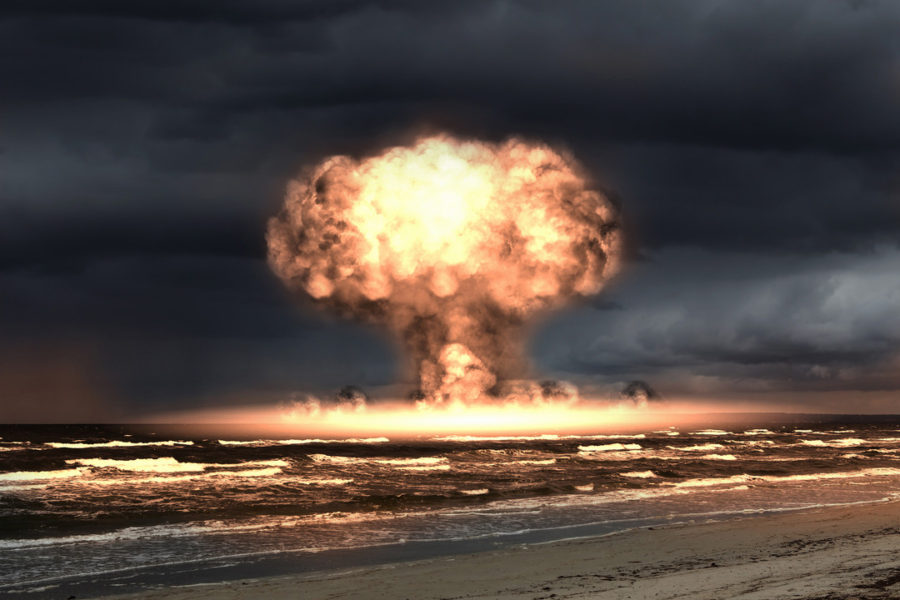Should we worry about nuclear war?
Picture this!
The clock reads two minutes to midnight. Two excruciating minutes that nobody wants to see pass.
Yet it doesn’t move with the normal notions of time. It ticks only to our carelessness, measuring how far we are from extinction.
First set in 1947 at seven minutes, by 1953 the Doomsday Clock advanced to a frightening two minutes to midnight when both the United States and Soviet Union had tested their first hydrogen bombs.
It’s never been there since.
That is until today.
That’s right! We’re just two minutes away from extinction. Yet, we’re too busy gazing at blood moons events or bickering about Brexit to notice. Even the stock market hasn’t priced it in.
But should we be worried?
Well, the threat of nuclear war is back.
The US has begun its official withdrawal from its landmark nuclear arms control treaty with Russia. The reason behind the move was their accusation that Moscow had violated their pact by continuing the development of banned missiles.
But it’s not that simple.
Since the Bush administration, the US has been building an impressive nuclear deterrent on Russia’s door step. They are installing the Aegis Ballistic Missile Defense System in former Warsaw Pact countries Poland and Romania, much to Russia’s dismay. Although these onshore installations provide anti-air missile defences, they are are also capable of simultaneously launching offensive cruise missiles.
Well if you poke the bear, it’s going to swipe back.
The result has been an unofficial and stealthy arms race, which hasn’t really been covered by the media.
There’s also been a huge degree of double standards. Russia may have violated the treaty and denied it (no surprises there), but the US has also done the same under the guise of missile defence.
Apart from nuclear war, there’s another threat to our human existence.
It’s global warming.

You can’t turn back time with global warning. Once it starts, the damage is done. And, it has already started.
Things are, however, being done to slow it down.
In 2015, the COP 21 Paris agreement was signed. It was the first time that an agreement on climate change had been reached by nearly all the nations on Earth.
Although the US pulled out, it was an historic event: these countries will cut carbon emissions to such an extent that they will halt rising global temperatures to just two degrees above pre-industrial levels.
It’s ambitious and such a cut will almost certainly impact economic growth because we haven’t achieved enough technological progress to fully replace fossil fuels.
Emerging economies, who signed up, will have to slow down. These high population-growth economies are consuming far too much energy in their quest to reach developed world living standards.
It’s much easier in the developed world. In fact, the US which ironically pulled out of the Paris agreement has seen carbon emission decline 12% between 2005 and 2012.
About half of this decline came from natural gas replacing coal in the electricity generation sector, which has also benefitted US industry. More efficient engine technology has also reduced emission from transport.
What’s interesting though is the low levels of economic growth likely to persist in the US. Lower levels of immigration, population aging, and declining fertility rates point to lower energy consumption. Emissions will fall because technology is being allowed to catch up.
There is no doubt that technological progress will lead to huge increases in renewable energy supply in the following decades. However, it won’t be enough to displace fossil fuel consumption that depressingly is set to rise alongside global economic growth.
It’s frustrating isn’t it?

Nuclear war and global warming are very real threats to our human existence. Yet perhaps there’s a bigger threat: the information age!
It seems bizarre, but the information age we’re in may create the perfect conditions to trigger either of these apocalyptic events. Increasing volumes of information make it hard to focus on what’s important or what’s real. The world is becoming faster and more complex. There’s fast-flowing fake news, social-media-fuelled election meddling and the state-backed intellectual theft of tech. Misinformation and outright lies are told with ease by governments, even in the “free world”.
Economic and scientific truths have been aggressively dismissed with little thought: there are still those out there who deny climate change.
Why I’m frustrated
The digital age should make investing easier. The free flow of information should help empower us to make better investment decisions. Yet it seems foul play has just got more sophisticated and harder to pinpoint. Innovation and intellectual property are easily stolen, copied and pasted. It is difficult to see how any company can sustain a competitive advantage, earn long-run abnormal profits and deliver fantastic shareholder value.
Despite advances made in accounting standards, financial statements are still not fully transparent or universally comparable. Lazy auditing practices and a management culture of living in accounting grey zones hasn’t disappeared with more publicly available information.
It’s sad.
The free flow of information should have created greater transparency. It should have empowered us to make better decisions from being better informed. In some ways, it has succeeded in shedding light on the deepest darkest corners of humanity. But at the same time, it’s creating new areas to hide in the complex web of data we have created.
Should we worry about nuclear war? Of course, we should. We should also worry about climate change. We should worry about our data protection and online privacy rights. We should worry about our democratic values being eroded through mis-information.
We need to worry. Otherwise we may sleep walk into extinction.












